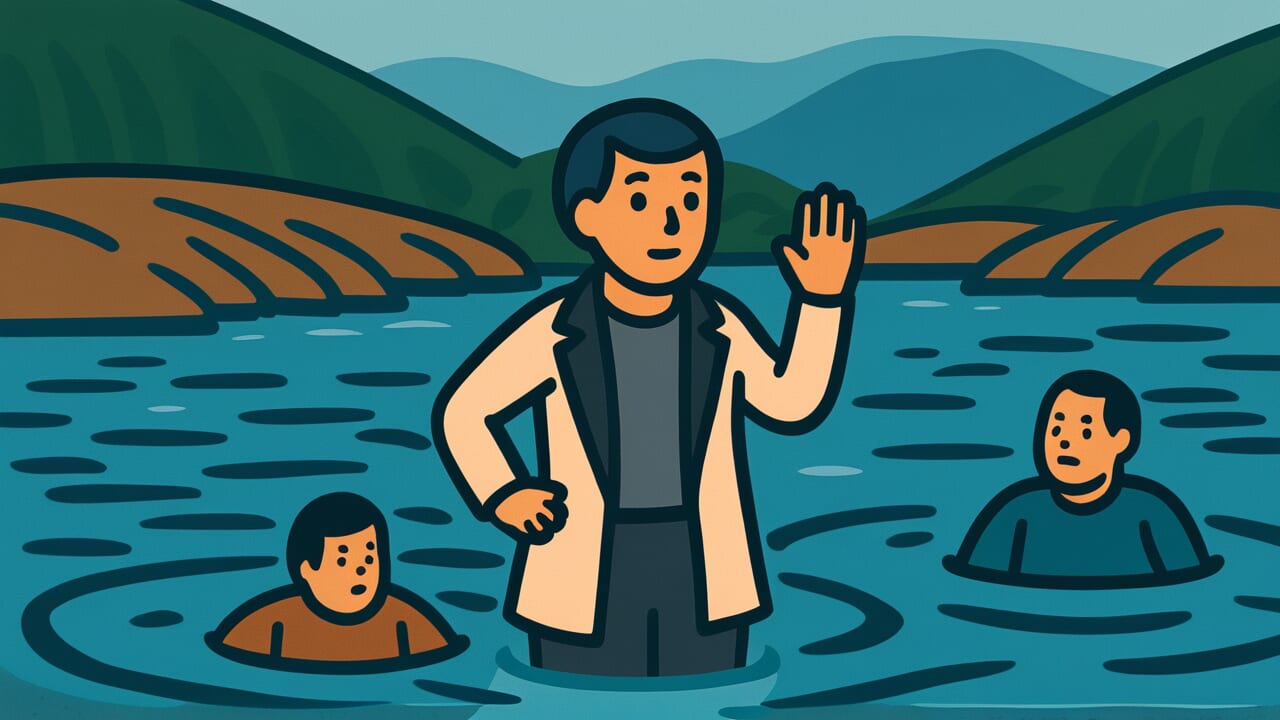How to Read “You can stand in a river, but you cannot stand among people”
Kawanaka ni wa tatedo hitonaka ni wa tatarezu
Meaning of “You can stand in a river, but you cannot stand among people”
This proverb means that even though you can handle natural challenges, it’s much harder to maintain your position in human relationships.
You can stand firm even in a rushing river. But you cannot stand among people. This contrast emphasizes how difficult human relationships truly are.
People use this saying when they feel the complexity and mental burden of human relationships. This happens at work, in social life, or in community settings.
Physical difficulties are one thing. But invisible stresses are much harder to bear. These include people’s judgments, evaluations, gossip, factional conflicts, and constant social considerations.
Even today, many people can face natural disasters or outdoor challenges. Yet they feel exhausted by workplace relationships or neighborhood interactions.
This proverb recognizes the unique difficulty of human relationships. It shows that this struggle is not personal weakness. It’s a universal challenge that everyone faces.
Origin and Etymology
No clear written records explain the origin of this proverb. However, the structure of the phrase offers interesting insights.
The first half, “you can stand in a river,” shows human ability to handle natural environments. River currents can be fierce and threatening. They can sweep your feet away.
But you can still keep your balance and stand firm. This is a physical challenge with clear solutions.
The second half, “you cannot stand among people,” expresses the difficulty of maintaining your place in human relationships. Here, “standing” doesn’t mean physical standing.
It means maintaining your social position and mental stability.
This contrasting structure suggests the proverb came from common people’s life experience. This likely happened before or during the Edo period.
People back then faced natural threats daily. Yet they found human relationships even more unbearable. Nature is harsh but honest.
Human hearts are invisible. Intentions clash and create unpredictable situations. This universal observation about human nature crystallized into a simple, contrasting expression.
Usage Examples
- I’m fine with mountain climbing, but “you can stand in a river, but you cannot stand among people”—I really struggle with workplace drinking parties
- I can spend hours in nature, but “you can stand in a river, but you cannot stand among people” is so true
Universal Wisdom
This proverb has been passed down for generations. It sharply points out a fundamental contradiction in human existence.
As biological beings, humans can adapt to harsh natural environments. We handle cold, heat, hunger, and dangerous terrain. We instinctively find ways to deal with physical difficulties and survive.
But ironically, when humans gather together, something more complex and unpredictable than nature emerges.
Why does this happen? Humans don’t just seek survival. We also seek invisible values like recognition, dignity, belonging, and superiority.
A river’s current may be fierce, but it has no malice. Human hearts, however, swirl with complex emotions. These include jealousy, competitiveness, self-protection, and pride.
What makes it worse is that human relationships have no “correct answer.” To stand in a river, you just follow physical laws.
But human relationships have no universal rules. Actions that please one person may offend another. Today’s right answer becomes tomorrow’s mistake.
This uncertainty exhausts people the most.
This proverb brilliantly captures the fate of humans as social animals. We cannot live alone, so we must stand among people.
Yet that is the most difficult thing to do. Our ancestors saw through this deep paradox.
When AI Hears This
When you stand in a river, water flows around your body. This resembles what fluid dynamics calls “laminar flow.”
Water molecules don’t exchange information with each other. They simply follow physical laws and move around obstacles. The water doesn’t think, “Let me consult other water molecules about this human.”
You can predict water flow using an indicator called the Reynolds number.
Human society works completely differently. When you conflict with someone, that person tells others. People who hear the story tell even more people.
Information spreads while changing form. Social network theory calls this the “cascade effect.”
For example, SNS research shows that negative information spreads 1.5 times faster than positive information. Plus, humans have memory, emotions, and the ability to form alliances.
The most important difference is “the presence of feedback.” In a river, upstream water molecules affect downstream ones. But not the reverse.
In human society, bidirectional influence continues infinitely. When you confront Person A, their friend Person B reacts. Person B’s actions change your reputation.
That creates new reactions. This unpredictable chain is what makes “standing” in human society so difficult.
Lessons for Today
This proverb teaches modern people to acknowledge the difficulty of human relationships. Don’t blame yourself too much.
In modern society, SNS has made human relationships even more complex. We worry about people’s opinions both online and offline.
We’re constantly exposed to evaluation. This environment pushes the difficulty of “standing among people” to its extreme.
That’s why this old proverb takes on new meaning today.
The important thing is understanding that feeling tired from human relationships is natural. It’s not because you’re not sociable. It’s not because you lack ability.
For human beings, continuing to stand among people is fundamentally difficult.
That’s why you sometimes need to place yourself in simpler environments. Like “standing in a river.” Spend time in nature. Think quietly alone.
Spend time with only a few trusted people. Such times give you strength to return to society.
Don’t try to handle human relationships perfectly. Continue relating to people at your own pace. Sometimes keep your distance.
That’s the modern wisdom this proverb teaches.



Comments